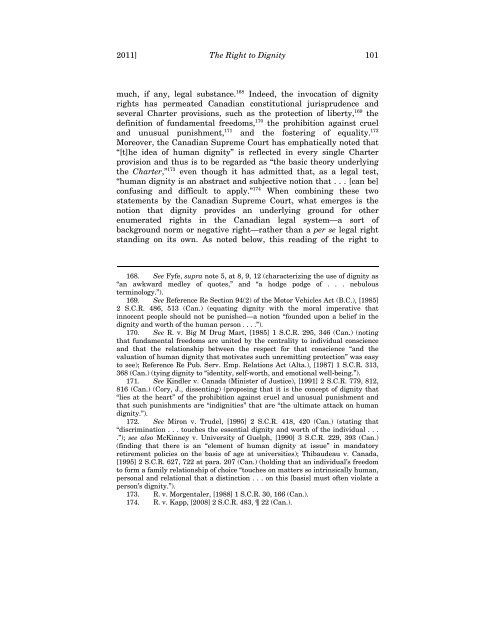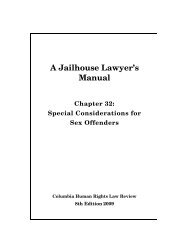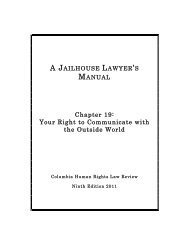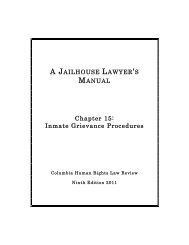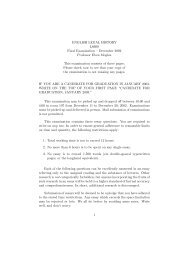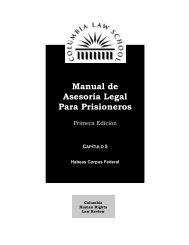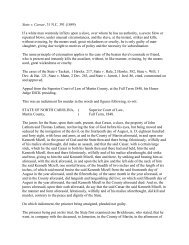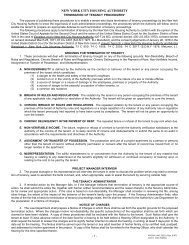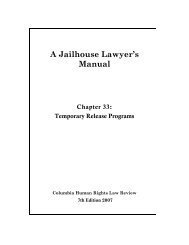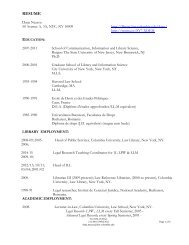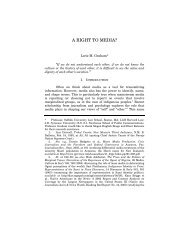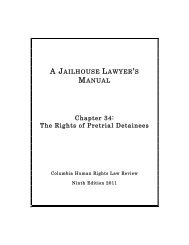The Right to Dignity Rex D. Glensy - Columbia Law School
The Right to Dignity Rex D. Glensy - Columbia Law School
The Right to Dignity Rex D. Glensy - Columbia Law School
You also want an ePaper? Increase the reach of your titles
YUMPU automatically turns print PDFs into web optimized ePapers that Google loves.
2011] <strong>The</strong> <strong>Right</strong> <strong>to</strong> <strong>Dignity</strong> 101<br />
much, if any, legal substance. 168 Indeed, the invocation of dignity<br />
rights has permeated Canadian constitutional jurisprudence and<br />
several Charter provisions, such as the protection of liberty, 169 the<br />
definition of fundamental freedoms, 170 the prohibition against cruel<br />
and unusual punishment, 171 and the fostering of equality. 172<br />
Moreover, the Canadian Supreme Court has emphatically noted that<br />
“[t]he idea of human dignity” is reflected in every single Charter<br />
provision and thus is <strong>to</strong> be regarded as “the basic theory underlying<br />
the Charter,” 173 even though it has admitted that, as a legal test,<br />
“human dignity is an abstract and subjective notion that . . . [can be]<br />
confusing and difficult <strong>to</strong> apply.” 174 When combining these two<br />
statements by the Canadian Supreme Court, what emerges is the<br />
notion that dignity provides an underlying ground for other<br />
enumerated rights in the Canadian legal system—a sort of<br />
background norm or negative right—rather than a per se legal right<br />
standing on its own. As noted below, this reading of the right <strong>to</strong><br />
168. See Fyfe, supra note 5, at 8, 9, 12 (characterizing the use of dignity as<br />
“an awkward medley of quotes,” and “a hodge podge of . . . nebulous<br />
terminology.”).<br />
169. See Reference Re Section 94(2) of the Mo<strong>to</strong>r Vehicles Act (B.C.), [1985]<br />
2 S.C.R. 486, 513 (Can.) (equating dignity with the moral imperative that<br />
innocent people should not be punished—a notion “founded upon a belief in the<br />
dignity and worth of the human person . . . .”).<br />
170. See R. v. Big M Drug Mart, [1985] 1 S.C.R. 295, 346 (Can.) (noting<br />
that fundamental freedoms are united by the centrality <strong>to</strong> individual conscience<br />
and that the relationship between the respect for that conscience “and the<br />
valuation of human dignity that motivates such unremitting protection” was easy<br />
<strong>to</strong> see); Reference Re Pub. Serv. Emp. Relations Act (Alta.), [1987] 1 S.C.R. 313,<br />
368 (Can.) (tying dignity <strong>to</strong> “identity, selfworth, and emotional wellbeing.”).<br />
171. See Kindler v. Canada (Minister of Justice), [1991] 2 S.C.R. 779, 812,<br />
816 (Can.) (Cory, J., dissenting) (proposing that it is the concept of dignity that<br />
“lies at the heart” of the prohibition against cruel and unusual punishment and<br />
that such punishments are “indignities” that are “the ultimate attack on human<br />
dignity.”).<br />
172. See Miron v. Trudel, [1995] 2 S.C.R. 418, 420 (Can.) (stating that<br />
“discrimination . . . <strong>to</strong>uches the essential dignity and worth of the individual . . .<br />
.”); see also McKinney v. University of Guelph, [1990] 3 S.C.R. 229, 393 (Can.)<br />
(finding that there is an “element of human dignity at issue” in manda<strong>to</strong>ry<br />
retirement policies on the basis of age at universities); Thibaudeau v. Canada,<br />
[1995] 2 S.C.R. 627, 722 at para. 207 (Can.) (holding that an individual’s freedom<br />
<strong>to</strong> form a family relationship of choice “<strong>to</strong>uches on matters so intrinsically human,<br />
personal and relational that a distinction . . . on this [basis] must often violate a<br />
person’s dignity.”).<br />
173. R. v. Morgentaler, [1988] 1 S.C.R. 30, 166 (Can.).<br />
174. R. v. Kapp, [2008] 2 S.C.R. 483, 22 (Can.).


